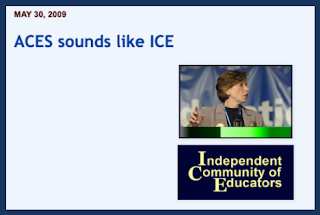For once, I’d love to read something from UFT leadership that doesn’t smack of fake progressivism and lip-service reform.
Not to say that a lot of what Retired Teachers chapter leader Tom Murphy says in the October newsletter isn’t about what we’re all feeling. It is. The country and its values are a mess under this administration, sold to the highest bidder, and not a single one of us who’s paying attention is feeling happy-clappy about the conversion.
But, but, but.
It’s lines like these that make me actually wince:
“Like any other labor and political progressives, I am hoping to play my part in transforming our national nightmare, reclaiming the rightful heritage of enlightened government.”
“Perhaps we are on the eve of a new Progressive Era, a New Deal or a New Frontier/Great Society.”
Why wear the mantle of progressivism when at no level does UFT/AFT leadership enter the fray?
“Words, words, words.” Hamlet, act 3
If after the congressional wins in 2018 Murphy says there’s now “a bit more clarity,” I have to ask: Why now? Educators have been have been seeing the “shadows of anti-union” and “regressive social policies” for decades, and guess what, the union has played right along with practically all the “erosion of ... labor achievements.”
Whose classes are smaller?
Who has real autonomy in the classroom or is being encouraged to bring their own talents and skills to the learning environment instead of having to conform to ridiculous cookie-cutter designs and dance before the mindless minions of DOE-trained administrators?
How many kids are getting the counseling they need?
And which of them is getting help with time-tested old-style math, grammar, civics, and vocational classes to allow them to function adequately in society?
Our union has done nothing about any of this, so don’t come to us now and say you’ve got “clarity” or that you “can’t give up fighting to prevent further erosion.” It is leadership itself that has given up the ghost on any of this a long time ago.
Moving on to what Murphy says about health care, I doubt very much that he or any other exec can “show the way.” Let’s look at the four health care “improvements” he mentions.
“Guarding pre-existing conditions...”
The regulation of pre-existing conditions started way back in 1945 (when it was left to individual states), and continued through laws enacted at the state level and Congress in 1974 (ERISA), 1978 (pregnancy), 1996 (HIPAA), and 2010 (ACA) (
Wiki). Since in some form or other pre-existing conditions legislation has been around for more than 40 years, I’d say guarding them is tantamount to keeping the status quo, nothing special.
“Cutting pharmaceutical prices, and allowing Medicare to negotiate drug prices...”
Our union clearly has helped
us, the rank-and-file members, with medical costs: My more expensive drugs don’t cost much, and I
love getting reimbursed for Part B premiums and IRMAA. But as far as fighting for cutting pharmaceutical prices for everyone else, I’m not so sure leadership has done a darn thing except yap about it.
The various proposals for drug coverage in Medicare all relied on “private pharmacy benefit managers on a regional basis to negotiate drug prices (
Wiki).” I’m just now finding out that the Dems actually advocated one-size-fits-all benefits nationwide, but were out-maneuvered by the Republicans, whose plans called for multiple choices and “a wide array of deductibles and co-pays (including the famous ‘donut hole’).” Those are what we’re stuck with til now. So, good on the Dems, but where was the union voice from 1999 to 2003 in that fight. Maybe I missed it.
“... and perhaps creating a public option.”
What a great word, “perhaps.”
But apart from that position of extreme fence-sitting, the public option is defined as “a proposal to create a government-run health insurance agency that would compete with other private health insurance companies” (
Wiki). Please tell me how that could work.
As far as I’m concerned, competition with private health insurance companies solidifies in stone their very existence, yet these companies are the very essence of the crazy cost and access problems in the current design. Again, the public option just can’t be part of what Murphy is calling a “new Progressive Era, a New Deal or a New Frontier/Great Society.” This position is about 5 mm left of center.
As for his last paragraph:
Our premise has to be the creation of a vision and perception in the midst of self-doubt. If there is ambiguity out there, then we have to sharpen our focus. Can we distinguish between seeing the safety of a domesticated dog or the threats of a wild wolf? I’m betting on clarity and vision.
Oh, my! I’m not entirely sure I’m getting his rhetoric, but as far as I can see, the union is very comfortable with “the safety of a domesticated dog” — it’s had so much practice.
As for “clarity and vision,” it hasn’t had much of either.






